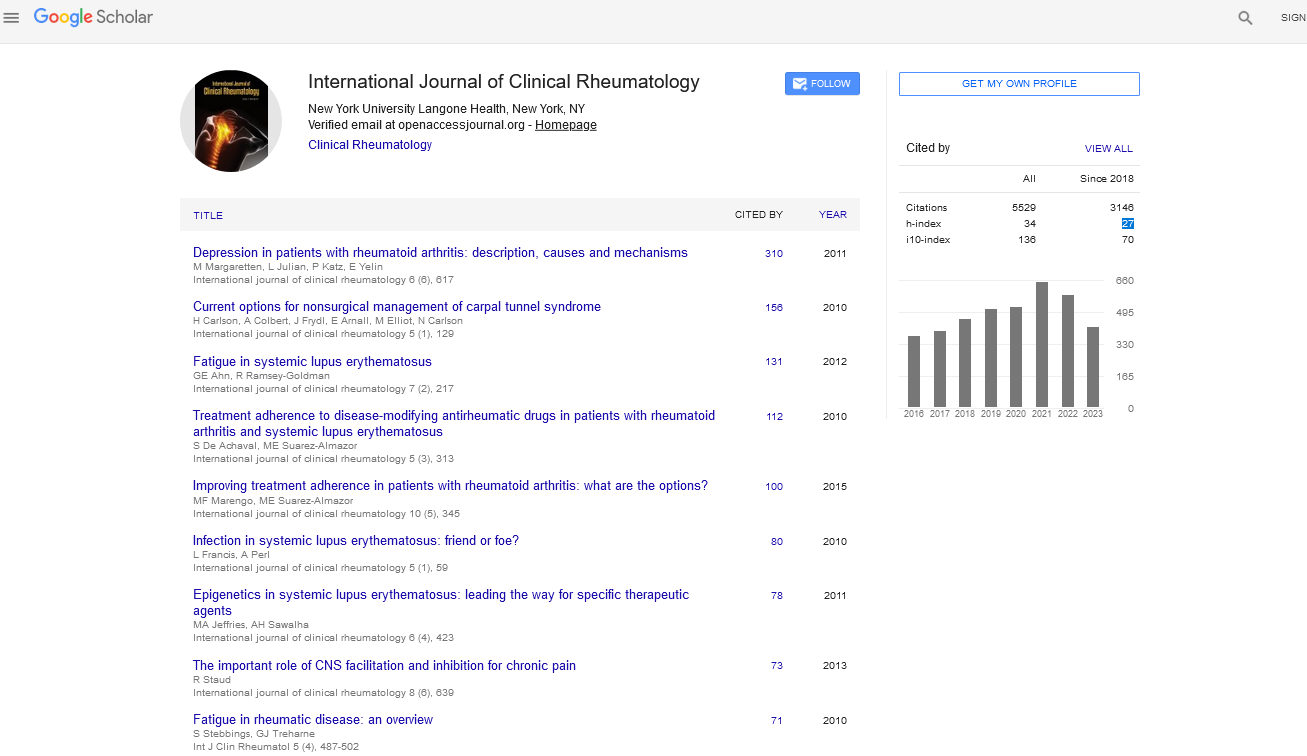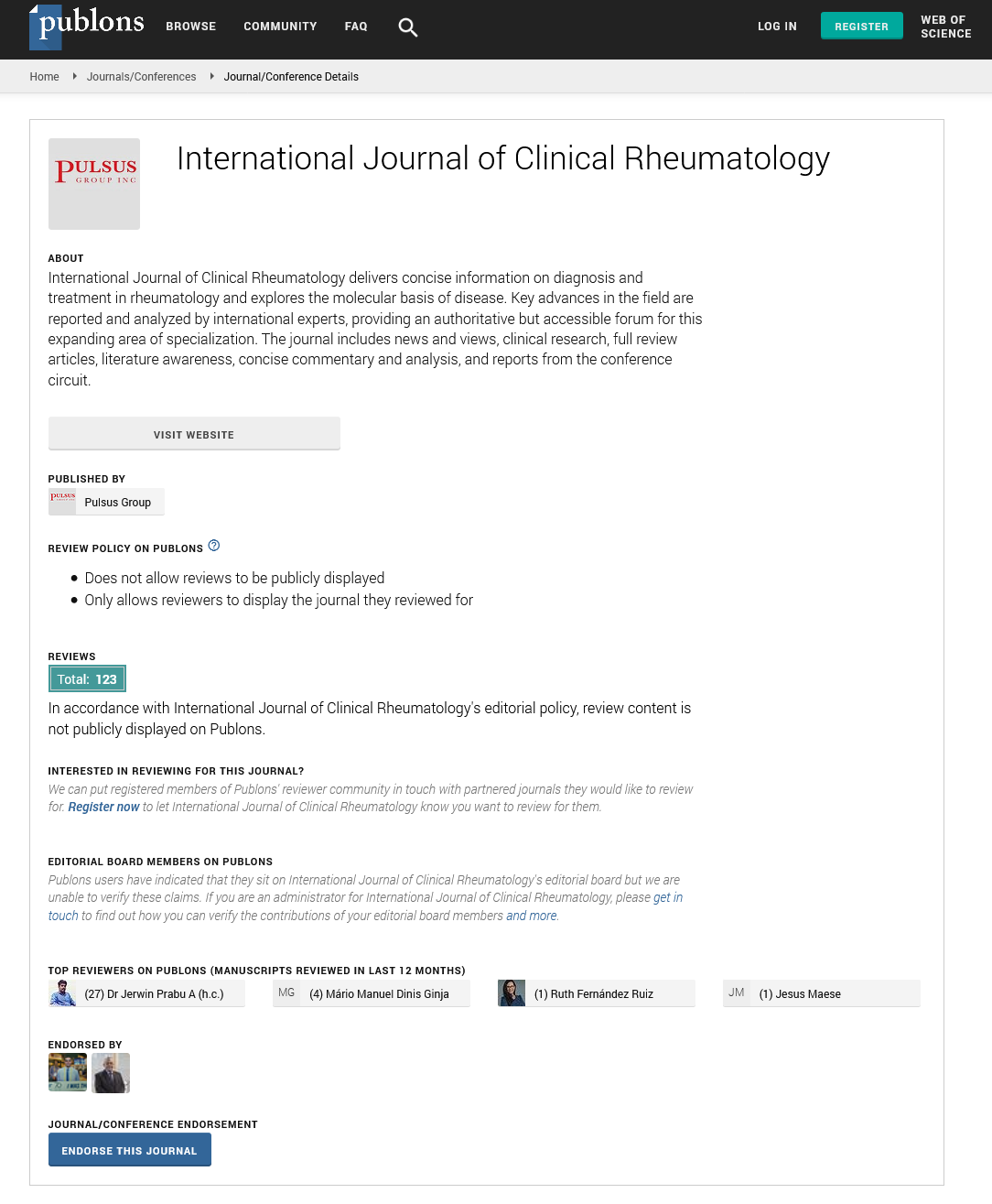Editorial - International Journal of Clinical Rheumatology (2024) Volume 19, Issue 5
Evaluating the Efficacy of New JAK Inhibitors in Psoriatic Arthritis Management
Alejandro Silva*
Rheumatology Unit, University of Buenos Aires, Buenos Aires, Argentina
- *Corresponding Author:
- Alejandro Silva
Rheumatology Unit, University of Buenos Aires, Buenos Aires, Argentina
E-mail: silva_a@gmail.com
Abstract
Psoriatic arthritis (PsA) is a chronic inflammatory arthritis associated with psoriasis, characterized by joint pain, swelling, and potential joint damage. Recent advancements in pharmacotherapy have introduced Janus kinase (JAK) inhibitors as a promising class of oral medications for managing PsA. This review aims to evaluate the efficacy of new JAK inhibitors in the management of PsA, focusing on their impact on disease activity, joint function, and patient quality of life. We conducted a comprehensive review of recent clinical trials, observational studies, and meta-analyses examining the efficacy of JAK inhibitors such as tofacitinib, baricitinib, and upadacitinib in PsA. Outcomes assessed include improvements in disease activity scores, physical function, and safety profiles. New JAK inhibitors have demonstrated significant efficacy in reducing PsA symptoms and improving joint function. Clinical trials show that these agents can achieve substantial reductions in disease activity, with a favorable safety profile compared to traditional treatments. The oral administration of JAK inhibitors offers a convenient alternative to injectable biologics, potentially enhancing patient adherence. The new JAK inhibitors represent a significant advancement in PsA management, providing effective treatment options for patients who are inadequately controlled with existing therapies. Ongoing research and long-term studies will be crucial to fully understand their benefits, risks, and optimal use in clinical practice.
Keywords
Psoriatic arthritis • JAK inhibitors • Efficacy • Therapeutic options • Comparative study
Introduction
Psoriatic arthritis (PsA) is an inflammatory arthritis associated with psoriasis, affecting approximately 30% of individuals with the skin condition. PsA can lead to joint pain, swelling, and potential deformity, significantly impacting patients' quality of life and functional capacity. Management of PsA traditionally involves nonsteroidal anti-inflammatory drugs (NSAIDs), conventional disease-modifying antirheumatic drugs (DMARDs), and biologic agents targeting specific immune pathways. Recent advances in the treatment of PsA have introduced Janus kinase (JAK) inhibitors, a new class of oral medications that offer a novel mechanism of action for controlling inflammation. JAK inhibitors work by targeting intracellular signaling pathways involved in the inflammatory process, providing a different approach compared to traditional biologics. Agents such as tofacitinib, baricitinib, and upadacitinib have emerged as promising treatments for PsA, with several recent studies evaluating their efficacy and safety. The objective of this review is to critically assess the efficacy of these new JAK inhibitors in the management of PsA. We will examine data from recent clinical trials and observational studies to understand how these medications impact disease activity, improve joint function, and affect overall patient quality of life. Additionally, we will discuss the safety profiles of these agents and their potential role in the broader spectrum of PsA management [1-4].
Discussion
Efficacy of JAK inhibitors
Recent clinical trials have highlighted the efficacy of JAK inhibitors in managing Psoriatic Arthritis (PsA). Agents such as tofacitinib, baricitinib, and upadacitinib have demonstrated significant improvements in disease activity scores, including reductions in the Psoriatic Arthritis Disease Activity Score (PADAS) and improvements in American College of Rheumatology (ACR) response criteria. Tofacitinib, one of the first JAK inhibitors approved for PsA, has shown substantial efficacy in reducing joint inflammation and improving physical function. Clinical trials such as the ORAL Standard and ORAL Step studies have demonstrated that tofacitinib effectively reduces symptoms and improves quality of life for PsA patients. Similarly, baricitinib and upadacitinib have shown promising results in recent studies, with significant improvements in disease activity and physical function [5].
Mechanism of action and benefits
JAK inhibitors work by interfering with the JAK-STAT signaling pathway, which is crucial in mediating the effects of several pro-inflammatory cytokines. By targeting this pathway, JAK inhibitors help to reduce inflammation and modulate the immune response more effectively than some traditional treatments. The oral administration of these agents provides a convenient alternative to injectable biologics, potentially improving patient adherence and satisfaction.
Safety and tolerability
The safety profiles of new JAK inhibitors have been evaluated in several studies. Overall, these agents are well-tolerated, with adverse effects generally being manageable. Common side effects include upper respiratory infections, headaches, and gastrointestinal symptoms. Long-term safety data is still evolving, and ongoing surveillance is necessary to monitor for rare but serious risks such as thrombosis or malignancies.
Challenges and limitations
Despite their advantages, JAK inhibitors are not without limitations. The high cost of these medications can be a significant barrier to access for some patients. Additionally, while the oral route of administration offers convenience, it also necessitates adherence to daily dosing regimens, which may impact patient compliance. Furthermore, given the novelty of JAK inhibitors, there is a need for more long-term studies to fully assess their long-term safety and effectiveness compared to other treatment options.
Future directions
Future research should focus on long-term efficacy and safety studies to better understand the potential risks and benefits of JAK inhibitors over extended periods. Additionally, studies comparing JAK inhibitors with other biologic agents in head-to-head trials will help determine their relative effectiveness and guide treatment decisions. Personalized treatment approaches, considering patient-specific factors such as comorbidities and previous treatment responses, will be crucial in optimizing the use of JAK inhibitors in PsA management [6-10].
Conclusion
New JAK inhibitors represent a significant advancement in the management of Psoriatic Arthritis (PsA), offering effective treatment options for patients who may not respond adequately to traditional therapies. Agents such as tofacitinib, baricitinib, and upadacitinib have demonstrated considerable efficacy in reducing disease activity, improving joint function, and enhancing patient quality of life. Their oral administration provides a convenient alternative to injectable biologics, potentially improving patient adherence and overall satisfaction with treatment. While the short-term benefits of JAK inhibitors are clear, ongoing research is essential to fully understand their long-term safety and effectiveness. Future studies should focus on comprehensive long-term safety profiles, cost-effectiveness, and comparative efficacy with other treatment options. The integration of these new therapies into clinical practice requires careful consideration of individual patient factors and treatment goals. In summary, JAK inhibitors have emerged as valuable tools in the management of PsA, offering promising options for improving patient outcomes. Continued research and clinical evaluation will be critical to maximizing the benefits of these therapies and addressing any potential challenges associated with their use.
References
- Ahmadi-Simab K, Lamprecht P, Jankowiak C, et al. Successful treatment of refractory adult onset Still’s disease with rituximab. Ann Rheum Dis 65: 1117-1118(2006).
- Lee WS, Yoo WH. Rituximab for refractory adult-onset Still's disease with thrombotic microangiopathy. Rheumatology (Oxford) 53: 1717-8(2014).
- Al-Samkari H, Kuter DJ. Optimal use of thrombopoietin receptor agonists in immune thrombocytopenia. Ther Adv Hematol 10: 2040620719841735(2019).
- Zufferey A, Kapur R, Semple JW. Pathogenesis and Therapeutic Mechanisms in Immune Thrombocytopenia (ITP). J Clin Med 6: E16(2017).
- González-López TJ, Alvarez-Román MT, Pascual C, et al. Use of eltrombopag for secondary immune thrombocytopenia in clinical practice. Br J Haematol 178: 959-970(2017).
- Mahévas M, Gerfaud-Valentin M, Moulis G, et al. Characteristics, outcome, and response to therapy of multirefractory chronic immune thrombocytopenia. Blood 128: 1625-30(2016).
- Gómez-Almaguer D, Colunga-Pedraza PR, Gómez-De A, et al. Eltrombopag, low-dose rituximab, and dexamethasone combination as frontline treatment of newly diagnosed immune thrombocytopaenia. Br J Haematol 184: 288-290(2019).
- Aljarad S, Alhamid A, Sankari A, et al. The impact of helicobacter pylori eradication on platelet counts of adult patients with idiopathic thrombocytopenic purpura. BMC Hematol18: 28(2018).
- Lee A, Hong J, Chung H, et al. Helicobacter pylori eradication affects platelet count recovery in immune thrombocytopenia. Sci Rep 10: 18198(2020).
- Zain MA, Zafar F, Ashfaq A, et al. Helicobacter pylori: An Underrated Cause of Immune Thrombocytopenic Purpura. A Comprehensive Review. Cureus 11: e5551(2019).
Indexed at, Google Scholar, Crossref
Indexed at, Google Scholar, Crossref
Indexed at, Google Scholar, Crossref
Indexed at, Google Scholar, Crossref
Indexed at, Google Scholar, Crossref
Indexed at, Google Scholar, Crossref
Indexed at, Google Scholar, Crossref
Indexed at, Google Scholar, Crossref
Indexed at, Google Scholar, Crossref


